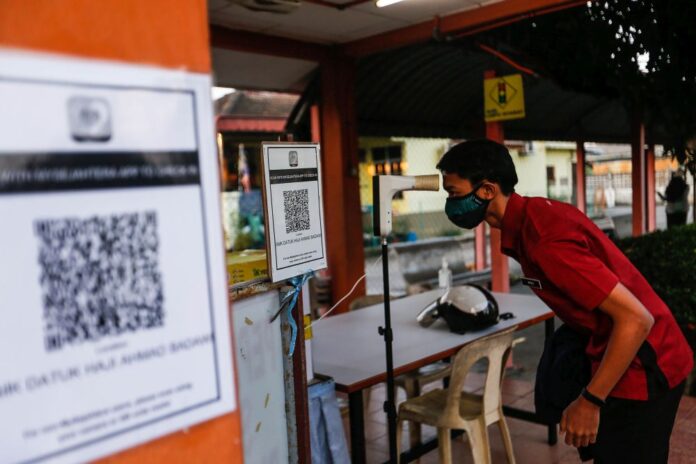A Form Six student has his temperature checked at Sekolah Menengah Kebangsaan Datuk Ahmad Badawi in Kepala Batas, Penang October 4, 2021. — Picture by Sayuti Zainudin
GEORGE TOWN, Oct 19 — Educators and parents must be more aware of the effects of pandemic burnout among children and teenagers, especially with schools reopening soon, said mental health counsellor Bryan John Dorai.
The psychology lecturer from Inti International College Penang said teens were vulnerable to pandemic fatigue and burnout, which may require steps to slowly ease them back into the school environment after months of online learning.
Younger children could also experience the same phenomenon, he said when noting it could also be more sinister among this group as they may not actively inform parents and teachers about their problems.
“It will be tricky to get the younger children to keep to the strict SOPs (standard operating procedures) and new normal due to their more impulsive nature,” he said.
It was consequently important for adults to instill in the children the importance in maintaining the Covid-19 preventive measures, he said.
“Education is the only way to go, they need to be continuously educated on the risks of the virus and learn how to mitigate the risks which can also lessen anxiety on the pandemic,” he said.
Other ways to manage pandemic burnout and fatigue among students could be for schools and local communities to organise mental health awareness programmes and counselling sessions, he suggested.
Child and adolescent psychiatrist Datuk Dr Lai Fong Hwa explained that adults would play a key role in setting the tone for the students’ return to schools after months of lockdown.
“If the adults around them treat all of these SOPs and the going back to school in a matter-of-fact way, it is likely that the children will not be anxious about any of it and they will accept and adapt easily,” he said.
He said maintaining SOPs was already habitual most everywhere else, not only in schools, so it was only a matter of educating the children on its importance when they go back to school.
Other than anxiety over the pandemic, educators and parents need also to find ways to address social anxiety and performance anxiety in school among students.
Dr Lai said schools will need to introduce a transition period for students where the first few weeks are “light study” classes instead of intensive lessons.
“Let them get used to their friends again and for mental health reasons, do not pressure them too much on their educational performance as they will pick up as we go along,” he said.
He said that, often, mental health stress on children was typically due to pressure from adults around them, and he hoped parents and teachers would not place overly high expectations on the students to perform well the moment they go back to physical classes in schools.
“Some children will be happy to be going back to school while some may be fearful, so they need extra support and this is where school counsellors play an important role to help these students transition back to the normal schooling system,” he said.
He said the pandemic has impacted everyone globally and students were also affected so they should be given leeway in terms of educational performance.
Bryan said educators could introduce more interactive programmes such as group projects and class presentations to ease social interaction among the students.
He said educators will need to work harder coming up with interesting programmes and projects to engage the students and keep them interested in learning in school again.
He also echoed Dr Lai’s emphasis on the importance of counselling for students who are unable to cope when they return to school.
“There is a need to organise mental health awareness programmes and maybe get non-governmental organisations such as D’Home Mental Health Association to come in and talk to the students,” he said.
He said these kinds of programmes are best introduced in schools and within the communities for students to talk to trained counsellors.
“The students have been stuck with their parents for a long time at home, so it may be hard for them to listen to their parents at this point,” he said.
He said educators and trained counsellors can reach out to students in a different environment outside of their homes which could be helpful especially for students coming from difficult or stressful home environments.
On Sunday, the Education Ministry announced that schools will resume physical lessons in stages beginning October 31, ending the months of closure since March this year.


